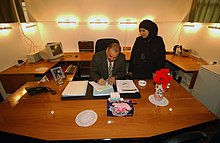Iraq Stock Exchange
This article needs to be updated. (September 2022) |
| سوق العراق للأوراق المالية | |
 | |
| Type | Stock Exchange |
|---|---|
| Location | Karrada, Baghdad, Iraq |
| Coordinates | 33°18′23″N 44°25′35″E / 33.30639°N 44.42639°E |
| Founded | 2004 |
| Key people | Taha Ahmad al-Rubaie (Executive Director) |
| Currency | IQD |
| Website | isx-iq.net |

The Iraq Stock Exchange (ISX), formerly the Baghdad Stock Exchange, is an Iraqi stock exchange located in Baghdad, Iraq. It was established by the Coalition Provisional Authority (CPA) Order No. 74 as a sui generis independent non-profit organization on April 18, 2004.[1] This order also created the Iraq Securities Commission and an Iraq Depositary. The stock exchange was part of the development of the country from a non-transparent centrally planned economy to a free market economy through a dynamic private sector.[2]
The Iraq Stock Exchange was incorporated and began operations on June 24, 2004.[3][1] It operates under the oversight of the Iraq Securities Commission, an independent commission modeled after the U.S. Securities and Exchange Commission. This body, which supervises the Board of Governors, initially served as the bridge between the country's previous state-owned stock exchange and the new independent exchange. June Reed is an American adviser to the stock exchange.[4]
Background
[edit]Before the 2003 invasion of Iraq, the country's stock exchange was called the Baghdad Stock Exchange and was operated by the Iraqi Ministry of Finance. Now it is a self-regulated organization similar to the New York Stock Exchange, owned by the 50 or so member brokerages.[5]
As of 2005, the ISX was Iraq's only stock exchange. It opened in 2004 with 15 companies, and now lists more than 100 companies. Turnover of shares in 2005 was approximately $5 million USD per trading session. Major stocks included Bank of Baghdad, Baghdad Soft Drinks Co, Iraqi Tufted Carpets Co, Hader Marble, and Altherar Agriculture.[5]
Aswat al-Iraq news agency covers every trading session with reports published on the web in English[6] and Arabic.[7]
Growth
[edit]Originally, trading was with pen and paper. Buyers shouted at or called into their brokers, who stood near their whiteboards that listed each company's share buy and sell price.[8][9][10]
Trading was suspended for several months in 2006 due to violence,[8] and is subject to power outages.
In 2006, 92 trading sessions were held (an average of 2 per week), 57 billion shares were traded (at a value of 146 billion dinars), and 38,000 trades were consummated.[11] The trading floor is currently open six hours a week: Sunday, Tuesday, and Thursday from 10:00 a.m. to 12:00 noon.[12]
The ISX opened to foreign investors on August 2, 2007.[13] It was unaffected by the Economic crisis of 2008.[14]
On April 19, 2009, the ISX switched to electronic trading. Currently, only five companies are available for electronic trading, but more will be added over the next few months.[15]
In the first quarter of 2018, the ISX became one of the world's top performers due to the influx of investors encouraged by the defeat of the Islamic state.[16] Companies listed on the market increased by 10 percent, anticipating economic recovery due to recent developments. This is particularly notable since the performance defied the violent swings experienced by global markets in the same period.[16] The ISX, however, still faces a number of challenges, which include political instability as demonstrated by the 7 percent loss in value during the May election, sporadic conflicts, and the price of oil, among other economic grievances.[17]
The Iraq stock Exchange is a member of the Federation of Euro-Asian Stock Exchanges.
See also
[edit]References
[edit]- ^ a b "نبــذة عنــا". www.isx-iq.net. Retrieved 2018-08-16.
- ^ Talmon, Stefan (2013). The Occupation of Iraq: Volume 2: The Official Documents of the Coalition Provisional Authority and the Iraqi Governing Council. Oxford: Bloomsbury Publishing. p. 426. ISBN 9781841136424.
- ^ Michaels, Jim (October 5, 2008). "Iraqi stock exchange small but surging". USA TODAY. Retrieved December 13, 2008.
- ^ "The Times & the Sunday Times". Archived from the original on 2020-10-03. Retrieved 2008-12-13.
- ^ a b Daragahi, Borzou (May 24, 2005). "Putting stock in Iraq Baghdad exchange is a whirlwind of fierce optimism". sfgate. Retrieved December 13, 2008.
- ^ "Economic Summary". Aswat al-Iraq.
- ^ "Economic Summary" (in Arabic). Aswat al-Iraq.
- ^ a b Haynes, Deborah (December 20, 2007). "Baghdad stock exchange set to share in digital age". The Times. London. Retrieved December 13, 2008.[dead link]
- ^ Pepper, Daniel (February 6, 2008). "Baghdad's Stock Market Goes Modern". time. Archived from the original on February 9, 2008. Retrieved December 13, 2008.
- ^ "Iraqi Stock Exchange Trades Chalkboards For Computers – Radio Free Europe / Radio Liberty © 2010". Rferl.org. February 20, 2009. Retrieved March 26, 2010.
- ^ "سوق العراق للأوراق المالية". www.isx-iq.net. January 30, 2010. Archived from the original on September 11, 2009. Retrieved March 26, 2010.
- ^ "Iraqi stock exchange holds 3 trading sessions a week". Retrieved December 13, 2008.
- ^ Michaels, Jim (October 5, 2008). "Iraqi stock exchange small but surging". Usatoday.Com. Retrieved March 26, 2010.
- ^ "STOCKS SOAR! (IN BAGHDAD)". Archived from the original on December 4, 2008. Retrieved December 13, 2008.
- ^ Forbes.com – Iraq's Stock Exchange goes electronic Archived April 22, 2009, at the Wayback Machine
- ^ a b Coles, Isabel; Nabhan, Ali (2018-04-01). "Worried About a Global Markets Meltdown: Try Iraqi Stocks". Wall Street Journal. ISSN 0099-9660. Retrieved 2018-08-16.
- ^ England, Andrew (May 24, 2018). "Iraq's new government hamstrung by old economic woes". Financial Times. Archived from the original on 2022-12-11. Retrieved 2018-08-17.


 French
French Deutsch
Deutsch